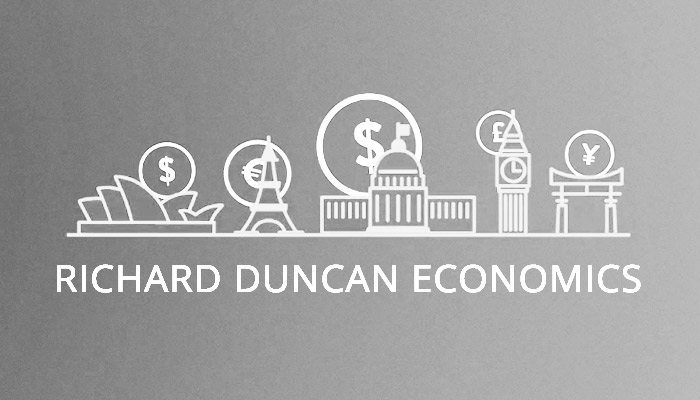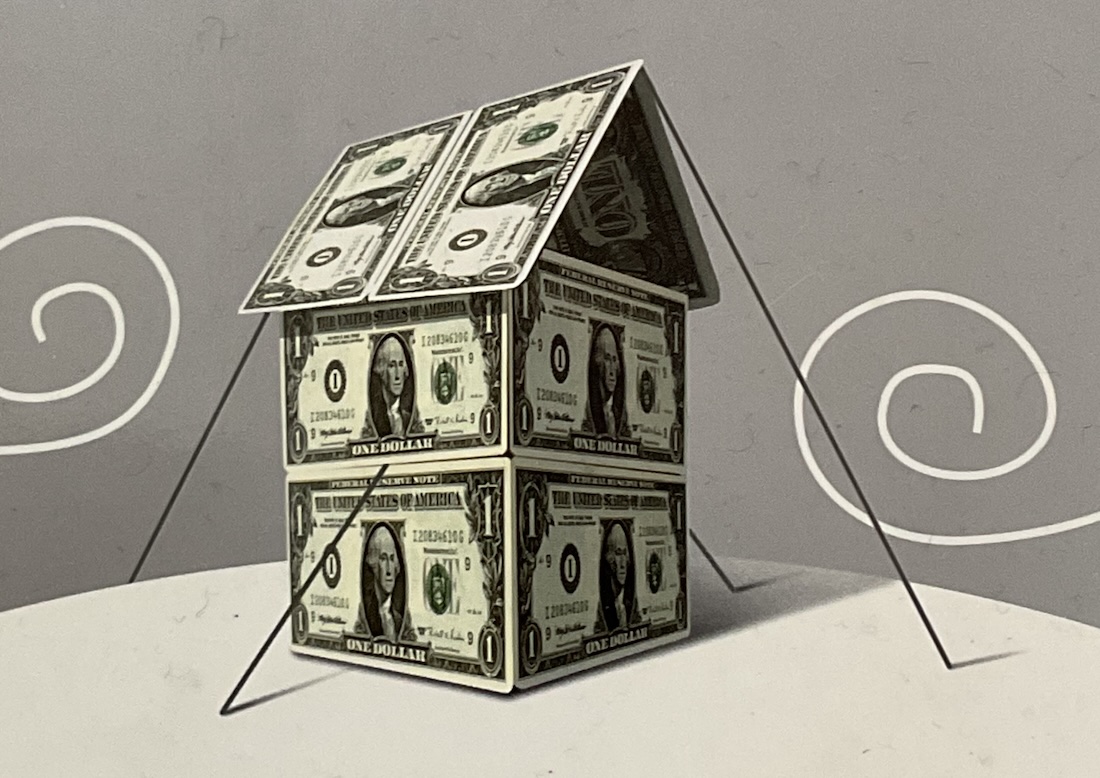Bullard’s Call To Extend QE Halts Market Panic

Posted October 17, 2014
Yesterday morning, St Louis Fed President James Bullard stopped the stock market crash in its tracks. In a live interview on Bloomberg Television, he said: “…I think a reasonable response of the Fed in this situation would be to … go on pause on the taper…” (i.e. to extend Quantitative Easing).
When he began that sentence the Dow was down 170 and dropping fast. When he ended it, the Dow was down only 50 points, a 120-point jump in the blink of an eye. I strongly recommend that you google and watch that interview.
Now the Fed is cornered. If it does not extend Quantitative Easing at its next FOMC meeting on October 28th and 29th, market panic will resume. In fact, the market may demand further assurances before then that QE won’t end. Janet Yellen is scheduled to deliver a speech at a Boston Fed Conference at 8:30 am ET today (October 17th). If she does not back Bullard up, the markets may tumble again when they reopen an hour later.
The Fed has been driving the economy by printing money and pushing up asset prices. If QE ends, I believe stocks will suffer a severe selloff and that the economy will spiral back into recession. I have explained this in numerous Macro Watch videos during the last year, including most recently in “The Prospects For Asset Prices” (uploaded October 2nd) and in “Slowing Global Liquidity Points To Deflation Ahead” (uploaded October 12th).
If you have not yet subscribed to Macro Watch, now is the time.
http://richardduncaneconomics.com/product/macro-watch/
For a 33% subscription discount, hit the “Sign Up Now” tab and use the coupon code: bullard


Hi Richard,
I see a possible obstacle to the continuation of Q3/implementation of Q4.
That is that the market panic last week prompted a rush into U,S government bonds, already bringing their yields down to new lows. So although further QE would be a great market stabilizer, the question must be asked “how can more be implemented when the panic into the bond market has already done the Feds work for it”? QE is meant to be a method of lowering interest rates rather than a way to boost the stock market for the benefit of the 5% who own 87% of shares. Won’t the Fed risk their credibility if they turn their policy towards helping stock investors rather than the overall economy? After all their mandate is supposed to be to maintain a healthy level of employment without high inflation, not to protect the recent healthy gains of stock investors. Kindly comment. Thanks. Peter
Hi Peter,
You have to keep in mind that the Fed has been making the economy grow by pushing up stock prices, creating a wealth effect that boosts consumption. It can’t permit stocks to fall. The global economy would spiral back into severe recession.
Best, Richard
Hi Richard, your last two Macro Watch videos have been excellent. I am growing increasingly concerned that the Fed will reach a point where their QE efforts won’t stimulate the stock market as they desire. As they continue QE, it will have a “Diminishing Marginal Effect”. If this happens, and the market realizes that the Fed’s control over stocks is waning, then I fear a significant market correction may be in order, perhaps back to 2009 lows. Any thoughts?
Thanks, Michael. Much appreciated!
You are right to be worried about Diminishing Returns on QE. Eventually, it may all end very badly. But, I think “eventually” is still some time off. The Fed still has a lot of fire power (as the market reaction post-Bullard on Thursday and Friday shows). I think it would be very dangerous to bet against their ability to make the market go up any time soon.
Best, Richard
Thanks Richard for sharing your ideas, but I would disagree with you on two things.
First, I think there are very few on Wall Street that think that the Fed will reverse there QE decision. I would not be surprised that when this current correction is all over, the S & P 500 will be down about 15% or so, and then we start moving higher again, but probably at a much slower pace. Do not forget, this is a mid term election year, the final quarter of a mid term year tends to be the strongest. Pre-election years are almost always up, and the same is true in decimal year 5’s. While I would not expect large gains next year, the odds to me say we are probably going to go higher in 2015.
And second, I think there is very little chance that we are heading into a recession within at least the next six months. Leading economics indicators from the Conference Board, make this pretty clear. Three of my favorite leading indicators, Housing Permits, Initial Jobless Claims and New Orders from the Purchasing Manager Index, all show that a new recession is nowhere to be seen.
Yes, Japan’s new recession, and a possible Eurozone one will hurt, and make it more difficult for our economy to grow is true. But panic selling on Wall Street. I doubt it. We would either need our markets to be much more over valued then they are right now, like in 1929, or 1987, for me to believe that panic selling is possible. I don’t even think a comparison to 1937 is fair, because in that year, short rates went up along with taxes, and neither is the case right now.
Just my two cents worth Richard.
I came across this worrying background info:
NEWS : US ECONOMY Last Updated: Oct 20, 2014 – 2:45 PM
Loans to buy US shares at record highs
By Michael Hennigan, Finfacts founder and editor
Oct 20, 2014 – 2:46 AM
Email this article
Printer friendly page
New York Stock Exchange, Wall Street, New York
Despite last week’s market volatility, the US economic recovery looks strong and the Federal Reserve has hinted that it will only raise interest rates if the outlook appears sustainable. However, while the 30- big company Dow Jones Industrial Average was up 30% last year including dividends, and only minor falls so far this year have impacted it, the latest data on loans used to buy shares show that margin credit is record highs.
The Financial Times says today that peaks in margin trading have been a precursor to bear runs in the past, notably in March 2000 and July 2007.
Margin debt collated by the New York Stock Exchange peaked in February at $466bn and stood at $463bn in August. The peak in 2007 was $381bn. It hit a low of $173bn in early 2009, according to the FT.
The Wall Street Journal warned in a piece on Friday that short-term issues such as Ebola and German industrial data, should not be the focus of long-term investors.
It said that: “An enormous body of academic research has proved time and again that your long-term investment returns will overwhelmingly depend instead upon just two things: asset allocation—how you spread your money between investments like stocks and bonds—and the value of those investments when you buy them.”
“Based on simple investment fundamentals, Boston-based GMO, a fund-management firm with $117bn under management, predicts that over the next seven years or so, investors should expect overall returns from most assets to be far below average. A typical balanced portfolio composed of those asset classes, GMO argues, may be lucky to beat inflation at all over that period.
Research Affiliates, an investment adviser in Newport Beach, California predicts mediocre returns over the next 10 years from nearly all asset classes. Only emerging-market stocks and emerging-market bonds are likely to match the historical returns from U.S. stocks and beat inflation by an average of five percentage points a year or better, the firm warns in a new forecast. Research Affiliates’ investment strategies are used by money managers with $180bn in assets.”
Bookmark with:
What are these?
digg del.icio.us reditt Newsvine stumbleUpon
© Copyright 2011 by Finfacts.com
Top of Page